International Digital Preservation Workshop 2024 | Apr. 14 – Apr. 26, 2024 | Information Page
Introduction
In October, 2016, a small team of researchers and professionals embarked upon a journey to digitally reconstruct and preserve many of the historically significant architectural, archeological and artistic treasures of the ancient city of Volterra, Italy. The results of this and subsequent workshops (in June, 2017; April, 2018; April 2019 and October 2022) have had great value to the team and the City of Volterra and have been recognized by nearly 40 international publications. We are very proud that our work was one of four projects to be recognized by the prestigious American Institute of Architects Technology in Architectural Practice Innovation Awards program and has most recently been featured by National Geographic in their documentary series “Lost Treasures of Rome” in the “Secrets of the Colosseum” episode.
In addition to having produced spectacular photo-realistic virtual replicas which may be used to share the experience of the city to anyone in the world, and for the city to have precise documentation for potential future reconstruction, the data has been used for research on ancient architecture which has resulted in significant discoveries and have been presented at several prestigious international archeological conferences.
Click here for a detailed description of the past workshops and research efforts.
There is still much work to be done and many more exciting discoveries to be made. We are therefore very pleased to offer you the extraordinary opportunity to join our team for our next workshop.
This workshop will provide an international educational and cultural experience in which participants will actively participate in digitally preserving and communicating the history of sites within the ancient City of Volterra, its archaeological remains and some of its treasured artwork. Participants will have hands-on experience using handheld cameras through photogrammetric technologies, and laser scanners to capture historically significant sites in the city and some of its treasured artworks. You will then learn how to utilize the capture data to produce various digital models, virtual reality experiences and other documentation to be able to digitally preserve and communicate the history of the sites.
We also hope to provide the participants with exposure to reality capture processes utilizing Unmanned Aerial Vehicles (UAV/Drones), but are currently working through changing regulations which may prohibit us from doing so.
The workshop will be led by subject matter specialists and will take place at the Volterra International Residential College. It will provide an unparalleled opportunity for participants to learn hands-on about these emerging and innovative technologies while collaboratively producing digital replicas of one of the most beautiful cities in the world; all while living and working there for two weeks!
Location
The workshop will be held in Volterra, Italy, an ancient Etruscan town in the middle of Tuscany. The hill upon which the city is located has been inhabited continuously for over 3000 years, and bears witness to all periods of its development, through architecture, material culture and tradition. Please see the Volterra-Detroit Foundation website for more information about the city (www.volterra-detroit.org)
Processes and Technologies
The workshop will provide all participants the opportunity to learn and participate hands on with the following technologies and processes:
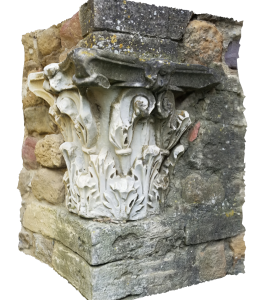 |
1. Photogrammetry We will utilize hand-held cameras to photographically capture artefacts, sculptures and small sites within the city and in museums. We also hope to utilize Unmanned Aerial Vehicles (UAV’s) or drones to photographically capture larger areas and sites outside of the city (depending on us successfully working through changing regulations). Textured mesh models and point cloud models will be produced from the photos using Autodesk ReCap Photo software with cloud services and potentially other software. On the left – a 3D model of a Corinthian column from the Roman theater in Volterra now installed in a wall of a XII century chapel. |
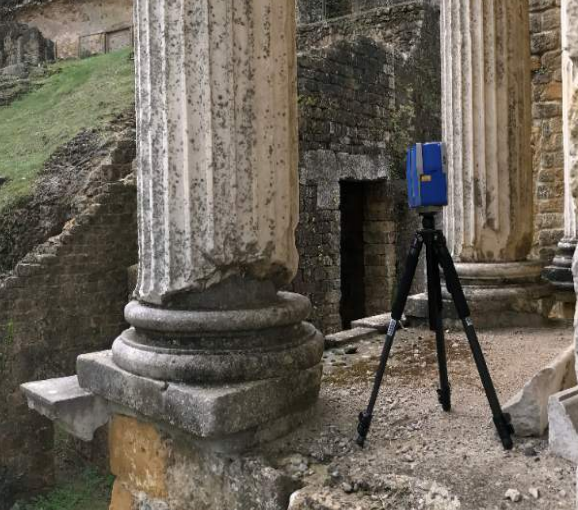 |
2. Laser Scanning Building exteriors and interiors will be captured into detailed point clouds using laser scanning technology. The point clouds will be registered and processed into models using Leica and Autodesk ReCap software. Textured mesh-models will be created from ReCap and Cintoo applications for visualization uses. Point clouds will also by linked into Autodesk Revit software to be used to construct detailed Historic Building Information Models (HBIM). On the left – a laser scanning of the Roman Theater in Volterra. |
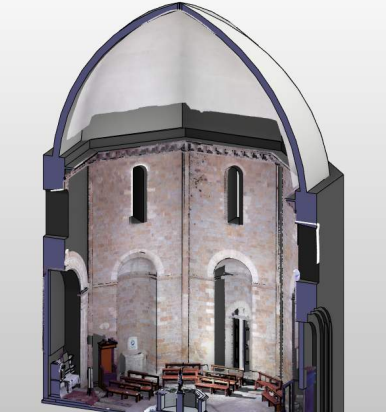 4 4 |
3. Scan to BIM Point clouds will also by linked into Autodesk Revit software to be used to construct detailed Historic Building Information Models (HBIM) and AutoCAD to produce precise two dimensional documentation as well. On the left – Revit model/scan data composite of the Volterra Baptistery. |
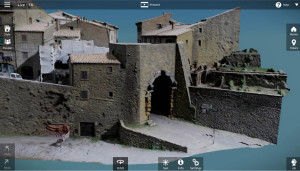 |
4. Interactive Model Display Models created will be prepared and optimized for experiencing through Epic Games Twinmotion and Unreal Engine software where interactive experiences may be developed to tell stories of their historical significance. On the left – VR model of the Etruscan Gate in Volterra. |
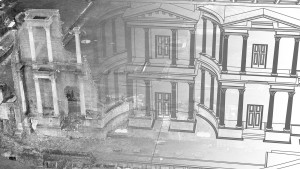 |
5. Managing and Sharing Scan and BIM Data via the Cloud We will utilize the Cintoo webservice to share and view large scan datasets in the cloud including in VR. This platform will also be used to combine and compare BIM and scan data as well as convert and download point clouds to textured mesh models for use in other visualization applications and VR. |
Subject Matter and Workshop Focus
In past workshops our primary focus has been on capturing the many amazing sites in the city. This year, although we will still be doing some capture, we are going to focus more on producing digital models, virtual experiences and documentation from the capture data. Therefore, we are going to encourage each participant to select and focus on one site, using either capture data we already have or will capture during the workshop to do so. This will include researching the history of the site and explaining that in the documentation and virtual experiences you will be creating.
We will conduct regular conference calls with the team leading up to the workshop to discuss these opportunities and to discover your own areas of interest to assist in site selection and to establish the final program.
Who Should Attend?
Professionals and students who have an interest in extending their knowledge through hands-on educational application of emerging reality capture technologies for any or all the following applications:
- Architecture – Efficiently creating Building Information Models of existing structures for use in as-built documentation, facilities management and design retrofits from laser scans.
- Urban Design and Planning – Efficiently creating digital models of large, complex urban environments captured using photogrammetric technology via drones and combined with other site features using GIS data.
- Historical Preservation – Creation of photo-realistic digital models of historic structures and artifacts captured using photogrammetric technology via drones and laser scans that may be used to better document important works and for potential use in reconstruction.
- Archeology – Efficiently creating accurate digital representations of archeological sites such as the Roman Theater captured using photogrammetric technology via drones and laser scans. Also, combining known but buried archeological sites in a digital city model to better communicate the important history of cities.
- Art History – Creation of photo-realistic digital models of important historical works of art via photogrammetric technology and laser scans to better document, study and share the works of art. Also, digital models could be used to create physical replicas of the art that may be experienced by touch.
- Public Relations, Marketing, Tourism – Using all of these technological processes to better communicate the experience and rich history of a city.
Technology Skills Required
While we would prefer to have participants who have at least some basic familiarity with reality capture and modeling processes, novices are welcome as the length of the workshop permits adequate time to learn the technologies. We will also provide selected participants with introductory learning material on the software we will be using before the beginning of the workshop so that you may have time to familiarize yourself. So, all are welcome to join us to participate and learn. Most importantly, we encourage all participants to share their knowledge with each other in an open, collaborative environment which we strive to maintain and expect from all participants.
Workshop Length and Format
The workshop will take place over a 12-day period which will allow adequate time to produce the outlined subject matter and to provide the participants with hands-on training and experience with all of the reality capture technologies and modeling software. Workshop facilitators will lead groups of participants who will focus on different subject matter and/or capture and modeling processes. Participants may shift between various processes to gain experience in all aspects or may choose to focus on particular aspects of interest. Final format will be determined via input from the participants, their specific interests and final subject matter selected as stated above.
Tentative General Schedule (Specific Schedule will be Developed as we Receive Team Input)
- Sun. 4/14 – Arrival in Volterra/Check-In, Introductory Team Dinner (check-in will be available on Sat. 4/13 if needed for travel)
- Mon. 4/15 – Fri. 4/19 Workshop Activities in Volterra (Potential Group Day Trip to Other Site)
- Sat. 4/20 – Sun. 4/21 – Optional Travel on Your Own
- Mon. 4/22 – Thur. 4/25 – Workshop Activities in Volterra (Potential Group Day Trip to Other Site)
- Thur. 10/25 – Final Presentation of Work
- Fri. 4/26 Depart/Check-Out (check-out will be available on Sat. 4/27 if needed for travel)
Accommodations
All participants will be accommodated at the Volterra International Residential College in the historic center of Volterra. Please visit the Volterra-Detroit Foundation website for more information about the facility. (http://volterra-detroit.org/2015/09/11/volterra-international-residential-college).
There is a communal kitchen at the facility where participants can cook their own meals, or they can eat at the local restaurants (meal plan details are below). All teamwork and the presentations will be held in the same building (unless otherwise stated in the program schedule), in the academic facilities on the first floor.
Cost
The cost per participant is:
$1875.00 (Shared bath)
$2325.00 (Private Bath – Limited to 3)
The fee covers the accommodation at the Volterra International Residential College and the workshop fee. The fee does not include airfare and travel costs, food and health insurance.
The Volterra-Detroit Foundation will also offer a flat rate pre-paid Meal Plan to the workshop participants, at a significant discount over the regular prices; and which is realized at selected restaurants in Volterra. The cost of the Meal Plan is $1125.00 per person and includes breakfast (continental at the school), lunch and dinner with one glass of wine (starts with dinner on Sun. 4/14 and ends with lunch on Fri. 4/26 and does not include Sun. 4/21). We highly recommend participating in the meal plan as this provides the team the opportunity to share progress and coordinate efforts.
Workshop Facilitators
- Mark Dietrick, Assoc. AIA, LEED AP
Director of Services, Case Technologies, Inc. - Paul F. Aubin, Assoc. AIA
Owner, Paul F Aubin Consulting Services, Inc. - Tristan Randall
Autodesk
Language
Workshop training and communications will be conducted in English.
Hardware/Software Required
All participants are required to bring their own laptop computer that meets the system requirements and is pre-loaded with the following software which will be provided to all who are accepted into the workshop:
- Autodesk ReCap Pro and Photo
- Autodesk AutoCAD
- Autodesk Revit
- Twinmotion for Revit
- Autodesk 3DS Max
- Leica Register
- Unreal Engine 5.3
End Product
All data produced is considered to be “open source”. All participants will be permitted to utilize any data produced for their PR, marketing and extended research purposes. It will also be provided to past and future workshop participants as well as other researchers under an open-source agreement. Participants will be required to sign a simple agreement acknowledging this.
Workshop Partners
- Volterra-Detroit Foundation
- Case Technologies, Inc.
- Autodesk
- Leica Geosystems
- Cintoo
Registration Schedule
- General Registration – Dec. 16, 2023 – Feb. 14, 2024
- Selected Participants Notified – Feb. 14, 2024
- Collaborative Team Planning Weekly Virtual Meetings – Feb. 14, 2024 – Workshop Start
Do not make final travel arrangements until you are notified of final selection!
Program requires 9 qualified applicants by this date to proceed.
If you are not selected or if the program does not receive 9 qualified applicants, your deposit of $500.00 will be refunded.
Register for the workshop here: International Reality Capture Workshop Registration page
If you have any questions please send email to: mark.dietrick(at)casetech.com.

